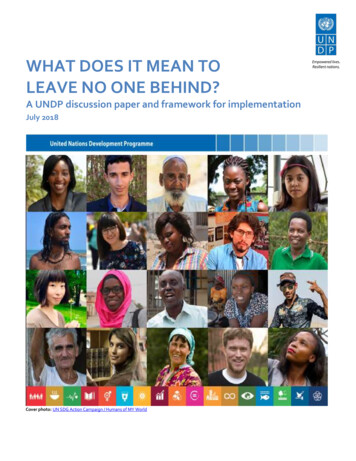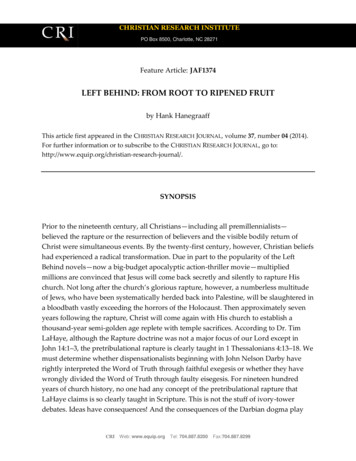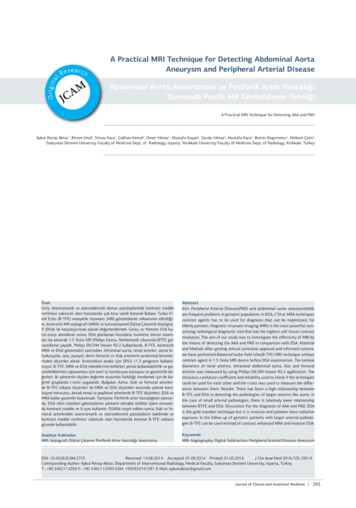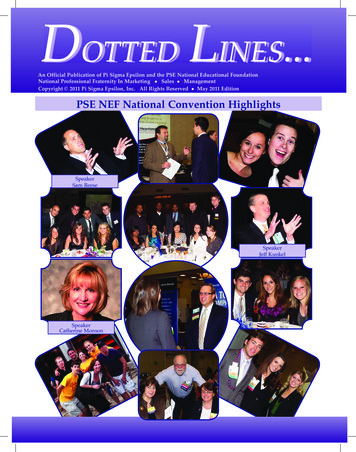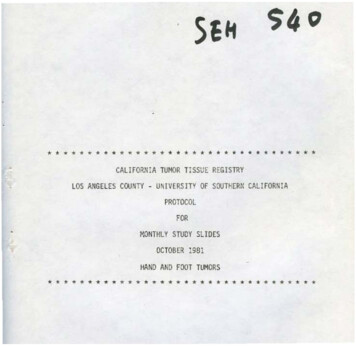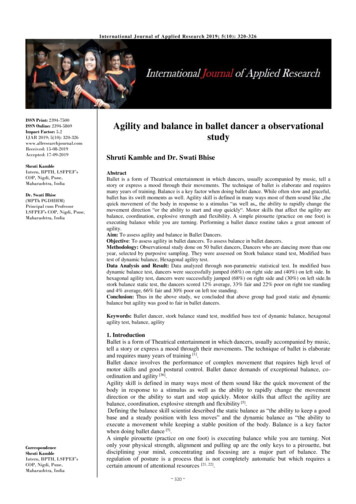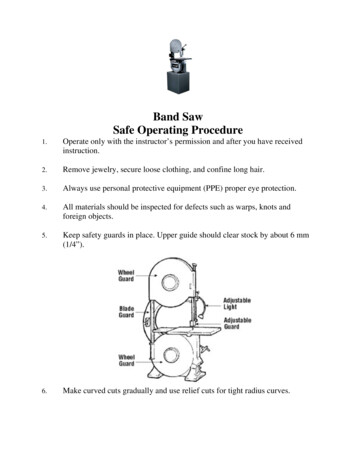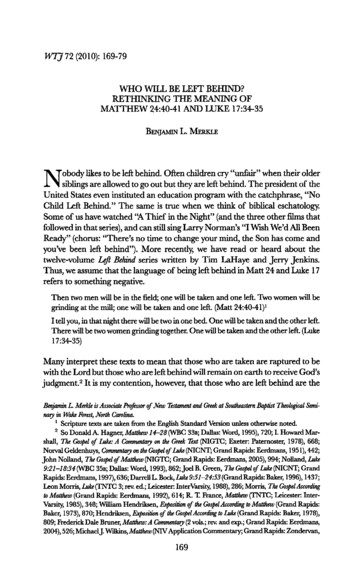
Transcription
WTJ 72 (2010): 169-79WHO WILL BE LEFT BEHIND?RETHINKING THE MEANING OFMATTHEW 24:40-41 AND LUKE 17:34-35BENJAMIN L. MERKLENobody likes to be left behind. Often children cry "unfair" when their oldersiblings are allowed to go out but they are left behind. The president of theUnited States even instituted an education program with the catchphrase, "NoChild Left Behind." The same is true when we think of biblical eschatology.Some of us have watched "A Thief in the Night" (and the three other films thatfollowed in that series), and can still sing Larry Norman's "I Wish We'd All BeenReady" (chorus: "There's no time to change your mind, the Son has come andyou've been left behind"). More recendy, we have read or heard about thetwelve-volume Lefi Behind series written by Tim LaHaye and Jerry Jenkins.Thus, we assume that the language of being left behind in Matt 24 and Luke 17refers to something negative.Then two men will be in thefield;one will be taken and one left. Two women will begrinding at the mill; one will be taken and one left. (Matt 24:40-41)1I tell you, in that night there will be two in one bed. One will be taken and the other left.There will be two women grinding together. One will be taken and the other left. (Luke17:34-35)Many interpret these texts to mean that those who are taken are raptured to bewith the Lord but those who are left behind will remain on earth to receive God'sjudgment.2 It is my contention, however, that those who are left behind are theBenjamin L. Merkle is Associate Professor of New Testament and Greek at Southeastern Baptist Theological Seminary in Wake Forest, North Carolina.1Scripture texts are taken from the English Standard Version unless otherwise noted.2So Donald A. Hagner, Matthew 14-28 (WBC 33B; Dallas: Word, 1995), 720; I. Howard Marshall, The Gospel of Luke: A Commentary on the Greek Text (NIGTC; Exeter: Paternoster, 1978), 668;Norval Geldenhuys, Commentary on the Gospel of Luke (NIGNT; Grand Rapids: Eerdmans, 1951), 442;John Nolland, The Gospel of Matthew (NIGTC; Grand Rapids: Eerdmans, 2005), 994; Nolland, Luke9:21-18:34 (WBC 35B; Dallas: Word, 1993), 862;Joel B.Green, The Gospel of Luke (NICNT; GrandRapids: Eerdmans, 1997), 636; DarrellL. Bock, Like 9:51-24:53 (Grand Rapids: Baker, 1996), 1437;Leon Morris, Luke (TNTC 3; rev. ed.; Leicester: InterVarsity, 1988), 286; Morris, The Gospel Accordingto Matthew (Grand Rapids: Eerdmans, 1992), 614; R. T. France, Matthew (TNTC; Leicester: InterVarsity, 1985), 348; William Hendriksen, Exposition of the Gospel According to Matthew (Grand Rapids:Baker, 1973), 870; Hendriksen, Exposition of the Gospel According to Luke (Grand Rapids: Baker, 1978),809; Frederick Dale Bruner, Matthew: A Commentary (2 vols.; rev. and exp.; Grand Rapids: Eerdmans,2004), 526; Michael J. Wilkins, Matthew ( M V Application Commentary; Grand Rapids: Zondervan,169
170WESTMINSTER THEOLOGICAL JOURNALones who are blessed whereas those who are taken are the ones who are judgedby God. I will demonstrate this thesis in three steps. First, I will establish thatthe imagery the prophets used to describe the destruction of the northern andsouthern kingdoms, and especially Jerusalem, is that those taken were judged byGod but the remnant that was left behind was shown mercy. Second, I will investigate the concepts of being taken and left behind in Jesus' teaching, includingthe contexts of Matt 24 and Luke 17 where Jesus employed judgment and exileimagery that is reminiscent of the OT prophets. This dependency on OT imagery favors interpreting these passages to mean that those left behind receive salvation. Finally, I will consider the precise language of Matt 24:40-41 and Luke17:34-35, particularly by way of answering several objections. Our thesis willthen be confirmed by Jesus' comparison of the people in Noah's day who were"taken" in judgment to those who are "taken" when the Son of Man returns.I. Left Behind in the Old TestamentIn order to understand the concepts of being taken and being left behind, itwill be helpful to examine these concepts in the OT. The prophets constandywarn Israel and Judah that their enemies will come and destroy their cities as apunishment from God. But God will not utterly destroy them. In his grace Godwill leave behind a remnant who will cry out for help and salvation. It is thosewho are left behind who are the blessed ones. This pattern is seen many times inthe OT prophetical books.For example, Isaiah prophesies concerning the future of Jerusalem.In that day the branch of the LORD shall be beautiful and glorious, and the fruit of theland shall be the pride and honor of the survivors (nü SsD; LXX, το καταλειφθέν)3 ofIsrael. And he who is left (ΊΝΦ; LXX, το ύπολειφθέν)4 in Zion and remains ("ΙΓΡ;LXX, το καταλειφθέν)5 in Jerusalem will be called holy, everyone who has beenrecorded for life in Jerusalem, when the Lord shall have washed away thefilthof thedaughters of Zion and cleansed the bloodstains of Jerusalem from its midst by a spiritof judgment and by a spirit of burning. (Isa 4:2-4)2004), 801; Joseph A. Fitzmyer, Luke 10-24 (AB 28A; New York: Doubleday, 1985), 1172; E. EarleEllis, The Gospel of Luke (Grand Rapids: Eerdmans, 1974), 212.3For uses of ilÜ D in reference to a remnant or those left behind, see Gen 45:7; Judg 21:17;2 Kgs 19:30, 31; Ezra 9:8, 13, 14, 15; Neh 1:2; Isa 10:20; 37:31, 32; Ezek 14:22; Joel 2:32; Obad1:17. For uses of καταλείπω in reference to remnant or left behind, see Gen 7:23; 14:10; Exod 14:28;1 Kgs 19:18; 2 Kgs 10:11; 25:11, 22; 2 Chr 21:17; 30:6; Ezra 1:4; 9:8, 15; Neh 1:2, 3; Isa 7:22;10:20, 21; 11:11, 16; 17:6; 24:6; 37:31, 32; 39:6; 49:21; Jer 40:6; 41:10; 42:2; 47:6; 49:2; 50:6;52:16; 1 Mace 2:18; 13:4; 16:8.4For uses of "IKÜ in reference to a remnant or those left behind, see Gen 7:23; 14:10; Exod14:28; 1 Kgs 15:29; 16:11; 19:18; 2 Kgs 10:11, 14, 17; 17:18; 19:30; 24:14; 25:11, 12, 22; 2 Chr21:17; 30:6; 34:21; Ezra 1:4; 9:8, 15; Neh 1:2, 3; Isa 10:20, 21, 22; 11:11, 16; 17:6; 24:6; 37:31; Jer39:9, 10; 40:6; 41:10; 42:2; 50:20; 52:15, 16; Ezek 9:8; 17:21; Amos 5:3; Zech 3:12; Hag 2:3. Foruses of ύπολείπω in reference to a remnant or those left behind, see 1 Kgs 15:29; 19:10, 14; 2 Kgs17:18; 19:30; 20:17; 24:14; 25:12; Prov 2:21; Jer 50:20; Ezek 12:16; 14:20-22; Amos 5:3; Zeph3:12; Zech 13:8.5For uses of ΊΓΡ in reference to a remnant or those left behind, see 1 Kgs 18:22; 19:10, 14;2 Kgs 20:17; 25:11; Prov 2:21; Isa 1:9; 39:6; Jer 39:9; 52:15; Ezek 6:8; 12:16; 14:22; Zeph 2:9; Zech13:8; 14:2.
WHO WILL BE LEFT BEHIND?171This text is a prophecy concerning the destruction of Jerusalem and the conse quent exile. Notice that those who are left and remain are the holy remnant. InIsa 3 the prophet describes how the Lord is "taking away" from Jerusalem andJudah their leaders (w. 1 -3). Because of their unfaithfulness God will wash awaythe filth of the ungodly people and Zion will be cleansed. But those who are leftbehind are considered the righteous remnant. Later in Isaiah we again readabout the coming judgment of God through the Babylonians. Isaiah prophesiesto Hezekiah that in the coming days all that the royal house possessed would becarried to Babylon: "Nothing shall be left ("ΙΓΡ; LXX, καταλίπωσιν), says theLORD, And some of your own sons, who will come from you, whom you willfather, shall be taken away and they shall be eunuchs in the palace of the king ofBabylon" (Isa 39:6-7). The idea of judgment is consistently bound up with theconcept of being taken away.Isaiah, however, is not the only prophet to employ such imagery. Jeremiahlikewise prophesies concerning the impending disaster that will come uponJerusalem: "Flee for safety, O people of Benjamin, from the midst of Jerusalem. . . for disaster looms out of the north, and great destruction" (Jer 6:1). Becausethe people refused to repent and seek the Lord, they would soon experience thewrath of God. In 6:11-12 the Lord condemns Judah.Therefore I am full of the wrath of the LORD; I am weary of holding it in. "Pour it outupon the children in the street, and upon the gatherings of young men, also; both hus band and wife shall be taken, the elderly and the very aged. Their houses shall beturned over to others, theirfieldsand wives together, for I will stretch out my handagainst the inhabitants of the land," declares the LORD.The imagery here is similar to that found in the Isaiah texts. The Lord is goingto punish his people for their sin by bringing judgment on them from othernations. These nations will destroy the city and kill many of its inhabitants.Although in this passage there is no mention of those who are left behind, it isclear that those who are taken away are the ones judged by God.Although many other texts might be noted, it will suffice to mention two othersfrom the Minor Prophets. Zephaniah describes God's judgment upon Jerusalemfor their open rebellion. Therefore the Lord declares that he will "remove" fromtheir midst those who are proud and arrogant (Zeph 3:11). He continues, "ButI will leave (ΤΗΚΕ?; LXX, ύπολείψομαι) in your midst a people humble andlowly. They shall seek refuge in the name of the LORD, those who are left (iTHKttf;LXX, oi κατάλοιποι) in Israel" (Zeph 3:12-13). According to this text, the unjustwill be taken but the righteous will be left behind. Finally, the prophet Zechariahspeaks the words of the Lord to the rebellious people: "In the whole land,declares the LORD, two thirds shall be cut off and perish, and one third shall beleft alive ("1ΓΡ; LXX, ύπολειφθήσεται)" (Zech 13:8). Again, those who are taken(or "cut off") are those who perish whereas those who are left behind remainalive.66Those who are left alive are not necessarily righteous, but in his grace God grants them physicalsalvation that they may turn to him. Some of these who are left may be taken into captivity, but in
172WESTMINSTER THEOLOGICAL JOURNALLike the prophets of the OT, Jesus announces the coming destruction ofJerusalem and he does so using the language of the prophets—language thatreminds the hearer or reader of God's judgment upon Jerusalem. Jesus' origi nal audience would have been well aware of such prophetic descriptions. Theywould have understood that to be taken was negative and to be left behindreferred to something positive.7II. Left Behind in Jesus3 TeachingMany who interpret the Matt 24 and Luke 17 passages as meaning that thosetaken are raptured to be with the Lord often cite 1 Thess 4:17 in their defense.8In this text Paul seeks to comfort the Thessalonian believers who were afraid thatthose Christians who died before the return of the Lord would miss out in thefuture kingdom. Paul, however, assures them that just as Jesus died and roseagain, so also those who already died in Christ would be resurrected at his return(cf. 1 Cor 15:50-52). In fact, their resurrection would precede the gathering ofbelievers who are still alive. Paul writes, "Then we who are alive, who are left (oiπεριλειπόμενοι), will be caught up together with them in the clouds to meet theLord in the air, and so we will always be with the Lord" (1 Thess 4:17). Thepicture here is that believers are taken to be with the Lord.There are at least three problems with using this text to interpret Matt 24 andLuke 17. First, we must be somewhat cautious of immediately interpretingJesus (and the Gospel writers) through Paul. Although we should take all Scrip ture as inspired by God and therefore unified in its message, it is best to look firstfor interpretive help in the same writer (in this case Matthew or Luke). Second,Paul's words are found in an episde. He is writing a letter to friends in order tocorrect their misunderstanding about the Lord's return. Jesus' words are in thecontext of a prophetic/apocalyptic section of the Gospels. Thus, it would seemmore helpful to consider similar passages from prophetic or apocalyptic litera ture. Finally, the context of Paul's words in Thessalonians is much differentthan Jesus' words in the Gospels. Paul is writing to comfort and offer hopewhereas Jesus' words are found in the context of judgment.The imagery of being taken as a sign of God's judgment is found elsewherein Jesus' teaching. In the Parable of the Weeds (Matt 13:24-30, 36-43) Jesuscompares the kingdom of heaven to a man who sows good seed in a field. Butwhile he was sleeping, the enemy sowed weeds among the wheat. Consequendy,the wheat and the weeds had to grow up together only to be separated at theharvest. Jesus interprets this parable by stating that the field is the world andtheir captivity many will repent and seek the Lord when they see the judgment of God. Consequendy,God will bring them back into the land (e.g., see Ezek 6:8-10; 14:21-23; 39:21-29; Dan 9:4-19).7I am not arguing that all of Matt 24 was fulfilled in A.D. 70 but that Matt 24:40-41 is found inthe immediate context where the destruction of Jerusalem is mentioned.8For example, Hendriksen states, "What does 'taken' mean? The answer is found in I Thess.4:17, 'They shall be caught up in the clouds to meet the Lord in the air"' (Luke, 809). Similarly, Mor ris writes, "Jesus does not explain what he means by taken, but evidently it means taken to be withhim {cf 1 Thes. 4:17)" {Luke, 286).
WHO WILL BE LEFT BEHIND?173that the wheat represents children of the kingdom whereas the weeds are children of the evil one. The time of the harvest represents the end of the age andthe reapers are the angels. He continues, "The Son of Man will send his angels,and they will gather out of his kingdom all causes of sin and law-breakers, andthrow them into the fiery furnace" (Matt 13:41-42). Although we must be cautious of pressing the details of a parable, it is worth noting that in this passage itis the unrighteous who are taken away so that those left behind can enjoy thekingdom. "Then the righteous will shine like the sun in the kingdom of theFather" (Matt 13:43).9Similar to the OT prophetic passages depicting God's wrath upon Jerusalem, Matt 24 is also colored with the theme of judgment. The conversationbetween Jesus and his disciples begins when Jesus predicts that the temple willbe utterly destroyed (v. 2). In answering the disciples' questions about when thetemple will be destroyed and the signs of the end of the age, Jesus warns thedisciples about false Christs, false prophets, and how lawlessness will increaseand love will grow cold (w. 3-14). The judgment language of Jesus is then intensified as he specifically uses judgment imagery from the OT to describe the situation in Jerusalem when it will be decimated.[L]et those who are in Judeafleeto the mountains. Let the one who is on the housetopnot go down to take what is in his house, and let the one who is in thefieldnot turnback to take his cloak. And alas for women who are pregnant and for those who arenursing infants in those days! (Matt 24:16-18; cf. Luke 17:31-32)The picture here is of a powerful enemy coming to conquer the land and kill itsinhabitants. There is no time to gather one's belongings. People will have notime to enter their homes to collect their possessions or turn back from the fieldsto collect their cloaks. Pregnant women and nursing mothers are to be pitiedbecause of their limitations in attempting to run away from the enemy. Thisimagery is reminiscent of the destruction of Jerusalem in 587 B.C. Just as theBabylonians ransacked the city and slaughtered many of its residents, so toothere will be great tribulation when God again judges the city. In order to avoidbeing "taken away" by the enemy, it is necessary to flee to the hills and run foryour life.9It should be noted that Rev 14:14-20 indicates two separate times the earth is reaped—agrain harvest (v. 16) and a grape harvest (v. 19). There are two common views on this text:first,bothharvests represent the judgment on the wicked, so G. K. Beale, The Book of Revelation (NIGTC;Grand Rapids: Eerdmans, 1999), 770-78; David E. Aune, Revelation 6-16(WBC 52B; Waco: Word,1998), 801-3; R. H. Charles, A Critical and Exegetical Commentary on the Revelation of St. John (2 vols.;ICC; Edinburgh: T&T Clark, 1920), 2:18-26. Also see Morris who does not commit to this view butstates, "There is nothing in the context to show that the righteous are in view" (Leon Morris, Revelation [rev. ed.; TNTC 20; Grand Rapids: Eerdmans, 1987], 179). In another common interpretation of Rev 14:14-20, thefirst(grain) harvest represents the gathering of the church, and the second(grape) harvest symbolizes the gathering of the wicked for judgment, so Dennis E. Johnson, Triumphof the Lamb: A Commentary on Revelation (Phillipsburg, N.J.: Presbyterian & Reformed, 2001), 209-14;George Eldon Ladd, A Commentary on the Revelation of John (Grand Rapids: Eerdmans, 1972), 198202; William Hendriksen, More Than Conquerors: An Interpretation of the Book of Revelation (1940; repr.,Grand Rapids: Baker, 1967), 154-56; H. B. Swete, Commentary on Revelation (3d ed.; 1911; repr.,Grand Rapids: Kregel, 1977), 190.
174WESTMINSTER THEOLOGICAL JOURNALThe context of the left behind passage in both Matthew and Luke includes acomparison with Noah and the great flood (Matt 24:37-39; Luke 17:26-37). Asin the days before the flood when people were living life as usual, so it will bewhen the Son of Man returns. He will come at a time when people are unawareand, like those during the days of Noah, they will be swept away. It is clear fromthe Genesis account that the flood was brought upon the earth to judge itsrebellious inhabitants. Similarly, the Son of Man will return when people leastexpect. Some will be taken away like those in the flood but others will be leftbehind and experience salvation similar to that of Noah and his family.In the Lukan account there is the additional comparison of Lot and the cityof Sodom (Luke 17:28-29). On the day that Lot departed from Sodom "fireand sulfur rained from heaven and destroyed them all" (Luke 17:29). Luke thenadds the powerful warning, "Remember Lot's wife" (Luke 17:32). What needsto be emphasized at this point is that this event is a vivid reminder of God'sjudgment on the ungodly. Those who seek to turn back, like Lot's wife, will fallunder condemnation.Matthew also relates the return of Christ to that of a thief (Matt 24:42-44). Athief comes to steal at night when the owner of the house is sleeping. Jesus, likethe thief, will return at a time when many are not ready and they will consequendy be judged. Using another analogy, Jesus also warns his audience byinforming them that those wicked servants who act unrighteously because theirmaster is delayed will be condemned, cut into pieces, and thrown into a placewhere there will be weeping and gnashing of teeth (Matt 24:48-51). Afinalillustration that emphasizes the judgment element of Jesus' teaching is found in theLukan narrative. Luke ends the section on the coming judgment with the proverbial statement, "Where the corpse is, there the vultures will gather" (Luke17:37).The reason for examining the context of the Matt 24 and Luke 17 passages isto demonstrate that the sayings of Jesus concerning one being taken away andone being left behind are couched in a prophecy that stresses God's judgment.Similar to the days of Noah, Lot, and the destruction of Jerusalem, so it will bewhen the Son of Man returns. Many, because they are unprepared, will be takenaway to destruction, whereas those left behind will receive grace and salvation.III. Ufi Behind in Matthew 24:40-41 and Luke 17:34-35In both the OT and NT the picture of God's judgment involves the ungodlybeing taken away while the righteous are left behind. The question before us,then, is whether or not this same pattern is found in Matt 24:40-41 and Luke17:34-35. In order to demonstrate that this is indeed the case we will now examine the particular language of these passages, primarily by way of answeringseveral objections.Interestingly, most commentators interpret the notion of being taken away assomething positive and being left behind as something negative. For example,Geldenhuys maintains that the text refers to "the faithful being taken up to
WHO WILL BE LEFT BEHIND?17510meet Him [Jesus] and the unbelievers being left to undergo the judgment.*'What reasons are offered for this position? France argues that the verb "taken'*(παραλαμβάνω, Matt 24:40-41; Luke 17:34-35) "implies to take someone to bewith you, and therefore here points to the salvation rather than the destruction11of the one 'taken'." Although it is true that the verb is normally used in thepositive sense (e.g., Jesus "taking along" his disciples), this usage is by no meansexclusive. Matthew 27:27 states, "Then the soldiers of the governor took (πάρα«λαβόντες) Jesus into the governor's headquarters, and they gathered the wholebattalion before him." In this usage of the verb, it is clear that the person beingtaken is not being taken along as a friend or companion* Rather, Jesus is beingtaken away to be beaten, mocked, and judged by the Roman leaders. Anothernegative use of the verb is found in John 19:16 where Pilate hands over Jesus tothe Jews to be crucified: "So he delivered him over to them to be crucified. Sothey took (παρέλαβον) Jesus." Again, it is evident that the verb is used negatively.Thus, the argument that the verb παραλαμβάνω inherently communicates apositive notion cannot be sustained.12A stronger argument favoring the interpretation that being left behind is some thing negative is found in the usage of the verb "left" (άφίημι, Matt 24:40-41;Luke 17:34-35). It is sometimes noted that this verb is consistendy used to referto something that is abandoned or forsaken (e.g., see Matt 4:20, 22; 19:27, 29;23:38; 26:56). Although this argument is certainly valid, there may be a reasonwhy Matthew and Luke use the verb άφίημι. In Matt 24:2 Jesus prophesies,"Truly, I say to you, there will not be left (άφεθη) here one stone upon another thatwill not be thrown down." In this text Jesus is indicating that God's judgment willcome against Jerusalem and particularly the temple. Nothing, not even onestone, will escape the comingjudgment. But later, regarding his Second Coming,he states that some people will escape the judgment of God. One will be takenbut, because of God's mercy, one will be left. God's judgment will not visit thisone but rather it will leave (or abandon) him. Thus, because the visitation ofGod's judgment is the focus of the passage, it seemsfittingto express the escapingof such judgment as being left behind (similar to the tenth plague in Egypt wherethe obedient Israelites were passed over—i.e., they were not taken by God'swrath but were left behind). They are not ultimately left behind or abandoned byGod, but are those whom God's wrath passes over and leaves behind. Those who10Geldenhuys,Z 442.France, Matthew (TNTC), 348. France later changed his position. He writes, "The verb[παραλαμβάνω] in itself does not determine the purpose of 'taking,' and it could as well be for judg ment (as in Jer 6:11) as for refuge. In light of the preceding verses, when the Flood 'swept away' theunprepared, that is probably the more likely sense here" (R. T. France, The Gospel of Matthew¡NICKT; Grand Rapids: Eerdmans, 2007], 941).12Perhaps a more difficult text is John 14:3 which uses παραλαμβάνω in the context of Jesustaking believers to be with him: "And if I go and prepare a place for you, I will come again and willtake (παραλήμψομαι) you to myself, that where I am you may be also." This context, however, isnotably different. Here Jesus is consoling his depressed disciples whereas the Matthew and Lukeleft behind passages occur in the context of judgment. There is also no mention of others being leftbehind but only of the disciples who will be taken.11
176WESTMINSTER THEOLOGICAL JOURNALare left behind ultimately experience salvation and the fullness of God's lovingpresence.Another argument that those taken receive salvation whereas those left behindare judged is based on a comparison with Matt 24:31. In this text Jesus declaresthat the Son of Man "will send out his angels with a loud trumpet call, and theywill gather his elect from the four winds, from one end of heaven to the other."13It is thought that the concepts of gathering and being taken can be equated,although it should be noted that the same verb is not used.14 Just as Matt 24:31teaches that God will gather his elect, so also w. 40-41 teach that God's chosenwill be taken and gathered to be with Christ. But there are at least two factors thatcast doubt on such an interpretation. First, the verb "gather" (έπισυνάγω) usedin Matt 24:31 is a cognate verb to that found in the Parable of the Weeds whereJesus says, "Gather (συλλέγω) the weeds first and bind them in bundles to beburned, but gather (συνάγω) the wheat into my barn" (Matt 13:30).15 What isimportant to notice here is that the gathering of the elect takes place after theunbelievers arefirstgathered (or taken). Thus, when the Son of Man comes, theunbelievers will be gathered first and then he will gather those who remain toenjoy the kingdom with their King.16 Perhaps this is also what takes place in1 Thess 4:17. The unbelievers are taken and those "who are alive, who are left,will be caught up together with them in the clouds to meet the Lord in the air."17Others claim that the imagery of Noah and Lot suggests that those who areleft behind are the ones left for judgment.18 Commenting on Luke's version of13For example, Hagner writes, "Presumably those who are 'taken' are among the elect whomthe angels of the Son of Man are to gather at his coming (v. 31), while those who are left await theprospect of judgment" {Matthew 14-28, 720). Also see Wilkins, Matthew, 801.14Matt 24:31 έπισυνάγω ("gathered"); Matt 24:40-41 παραλαμβάνω ("taken").15Interestingly, the verb used to describe the gathering of the children of the devil (συλλέγω) isdifferent from the verb used for the gathering of the children of the kingdom (συνάγω).16This interpretation alsofitsOT imagery of the remnant being gathered from the nations ofthe world. For example, Isa 11:12 states, "He will raise a signal for the nations and will assemble thebanished of Israel, and gather the dispersed of Judahfromthe four corners of the earth." Similarly,Isa 27:13 declares, "And in that day a great trumpet will be blown, and those who were lost in theland of Assyria and those who were driven out to the land of Egypt will come and worship the LORDon the holy mountain at Jerusalem." At least three points of comparison can be made with theIsaiah texts and Matt 24:31. First, the verb "gather" (συνάγω, LXX) in Isa 11:12 is a cognate verbto that found in Matt 24:31 (έπισυνάγω). Second, Isa 11:12 and Matt 24:31 speak of God gatheringhis people from the four "corners" or "winds" of the earth. Third, both Isa 27:13 and Matt 24:31mention a trumpet that will be blown. These parallels suggest Jesus (and/or Matthew) is deliber ately using imagery of God gathering his people from the exile. That is, God will gather his peoplewho have been left behind. Although the unrighteous have already been burned and killed, a rem nant will survive and be scattered over the face of the earth. But after a time, God will gather hispeople to regain possession of the land.17Gould Paul's use of oi περιλειπόμενοι ("those who are alive/remain") be a reference to thosewho are not merely alive when Jesus returns but those who also are not taken away? These who areleft behind are then gathered to Christ and will descend with him to experience the fullness of thekingdom.18For example, Nolland comments, "In the Lukan (and Matthean setting) the imagery of Noahand Lot encourages us to understand that being taken off is the image of deliverance and being left
WHO WILL BE LEFT BEHIND?177the passage, Darrell Bock claims, "The most natural reading, based on the pre vious examples of Noah and Lot, is that one is taken for salvation."19 This rea soning is not difficult to follow. Noah and his family entered the ark whereaseveryone else was left behind and died in theflood.Lot and his family departedfrom Sodom and those left behind experienced God'sfiercewrath. Thus, in bothcases it could be argued that those left behind were judged. The problem withBock's analysis is that it fails to take into account the notion of being taken. For,although it might be argued that the people of Noah's day and the people ofSodom were "left behind," it is not convincing to argue that Noah and Lot were"taken away." With the example of Lot, he and his family fled the wrath of God.This imagery is similar to Jesus' teaching that those on the housetops should notenter their houses and those in the fields should not turn back for their cloaks.Instead, they must immediatelyfleeor face the enemy who is coming to carry outthe judgment of God. Thus, the analogy fails because the issue is not that someare taken for salvation while others are left behind forjudgment. Rather, the issueis that the enemy is coming and whoever wishes to save his life must flee—andthose who do notfleewill be taken by the wrath of God.A similar analysis could be made with the example of Noah. There is littledoubt that Matthew views those who were killed by the flood as being "takenaway."For as in those days before thefloodthey were eating and drinking, marrying and givingin marriage, until the day that Noah entered the ark, and they did not understand untilthefloodcame and took them all away; so will the coming of the Son of Man be. (Matt24:38-39 NASB)Verse 39 states that thefloodcame and "took away" (ήρεν) the people. Althoughthis verb is different than the "taken" (παραλαμβάνεται) in w. 40 and 41, theproximity of these phrases strongly suggests that they are parallel. Supportingthis view Gundry notes, "But Matthew's parallelistic insertion of ήρεν in ν 39,where judgment is in view, makes the taking judgmental in his gospel. Hence,being left means being spared from inst
you've been left behind"). More recendy, we have read or heard about the twelve-volume Lefi Behind series written by Tim LaHaye and Jerry Jenkins. Thus, we assume that the language of being left behind in Matt 24 and Luke 17 refers to something negative. Then two men will be in the field; one will

